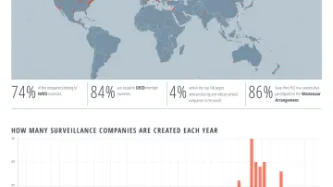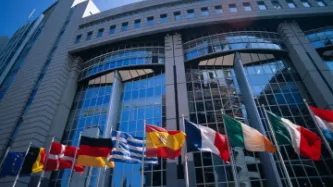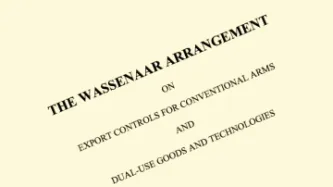Search
Content type: Press release
PI Research Officer Edin Omanovic said:
“The European Commission has proposed sweeping updates [PDF] to trade regulations in an effort to modernise the EU’s export control system and to ensure that the trade in surveillance technology does not facilitate human rights abuses or internal repression.
Privacy International welcomes the intentions of the proposed changes in terms of protecting human rights as it does all such moves. More than half of the world’s surveillance…
Content type: News & Analysis
Privacy International is today proud to release the Surveillance Industry Index (SII), the world's largest publicly available educational resource of data and documents of its kind on the surveillance industry, and an accompanying report charting the growth of the industry and its current reach.
The SII, which is based on data collected by journalists, activists, and researchers across the world is the product of months of collaboration between Transparency Toolkit and Privacy…
Content type: News & Analysis
The Coalition Against Unlawful Surveillance Exports (CAUSE) has today released a new policy paper calling on the EU to take the opportunity to update its Dual Use Regulation to ensure that surveillance technologies are not exported from Europe and used for human rights violations.
The proposals have been developed by the international secretariat of CAUSE, a coalition of NGOs consisting of Access, Amnesty International, Digitale Gesellschaft, Human Rights Watch, the…
Content type: Press release
Privacy International, Reporters Without Borders, Digitale Gesellschaft, FIDH, and Human Rights Watch welcome news that the European Commission will move ahead and add specific forms of surveillance technology to the EU control list on dual use items, thus taking steps to finally hold companies to account who sell spy equipment and enable human rights abuses.
These important steps demonstrate that policymakers are beginning to wake up to the real harm that exists…
Content type: News & Analysis
Facing intense scrutiny from a Swiss government inquiry into the human rights impact of the commercial surveillance trade, companies have packed up and are no longer attempting to export their spying technology from Switzerland.
Speaking with St. Galler Tagblatt, one of Switzerland’s largest German-language daily newspapers, government spokeswoman Marie Avet confirmed that the companies have cancelled export applications for surveillance technology - including all applications for…
Content type: News & Analysis
Only a few days after it was reported that intrusive surveillance technology developed and sold by Italian surveillance company Hacking Team was found in some of the most repressive countries in the world, Privacy International has uncovered evidence which suggests the company has received over €1 million in public financing.
It has come to Privacy International’s attention that Hacking Team appears to have received €1.5 million from two venture capital funds originating from the Region of…
Content type: News & Analysis
Update:
After an initial discussion with technical and government experts involved in drafting and negotiating the new controls on “intrusion software”, some of our initial questions have been clarified. To read what they had to say, go here.
One of the major dangers of imposing export controls on surveillance systems is the risk of overreach. While you want the scope of the systems being controlled and the language to be wide enough to catch the targeted product and its variants, you also…
Content type: News & Analysis
The proliferation of private companies across the world developing, selling and exporting surveillance systems used to violate human rights and facilitate internal repression has been largely due to the lack of any meaningful regulation.
But a huge step toward finally regulating this billion-dollar industry was taken this week, when on Wednesday night the 41 countries that make up the Wassenaar Arrangement, the key international instrument that imposes controls on the export of…
Content type: News & Analysis
Today’s much-anticipated launch of the 2013 Aid Transparency Index, an industry standard for assessing transparency among major aid donors, shows that, despite progress, many aid agencies continue to maintain secrecy around what they are funding.
Further, for those agencies that achieved high rankings in the index, transparency alone does not prevent one of our larger concerns: aid which facilitates impermissible surveillance of communities and individuals in the developing world.…
Content type: News & Analysis
In an encouraging first response to our complaint against surveillance company Gamma International (Gamma), the UK National Contact Point (NCP) of the Organisation for Economic Cooperation and Development (OECD) announced that it will further investigate our claim against Gamma, as the evidence submitted appears to substantiate our allegations.
In February 2013, Privacy International, together with the European Center for Constitutional and Human Rights, Bahrain Watch, the Bahrain Center…
Content type: News & Analysis
Earlier this year, Privacy International began research into the corporate social responsibility policies of companies that sell communications surveillance technology. Given that this technology is known to facilitate human rights abuses in repressive regimes around the world, surveillance tech companies that claims corporate responsibility might be expected to address such concerns in their CSR policy documents.
Of the 246 companies known to partake in the communications surveillance…








